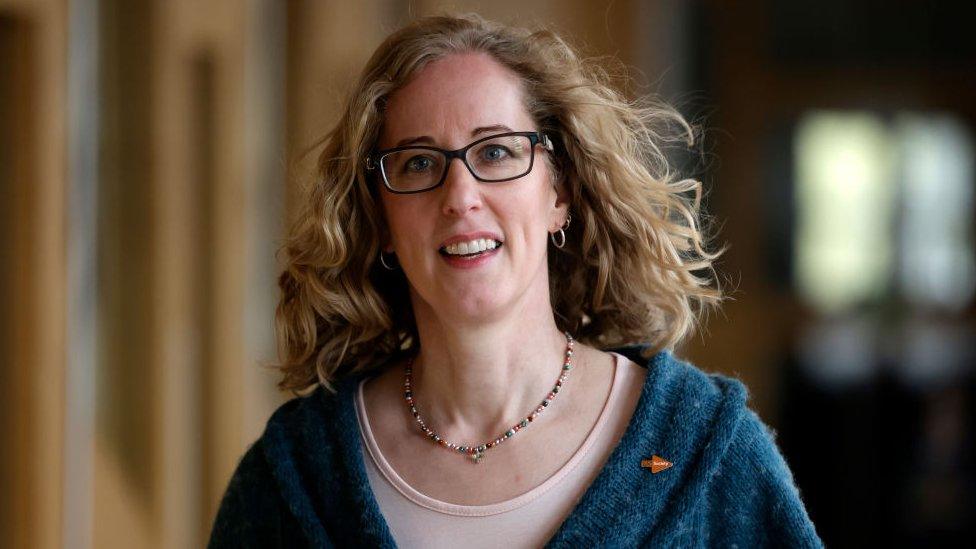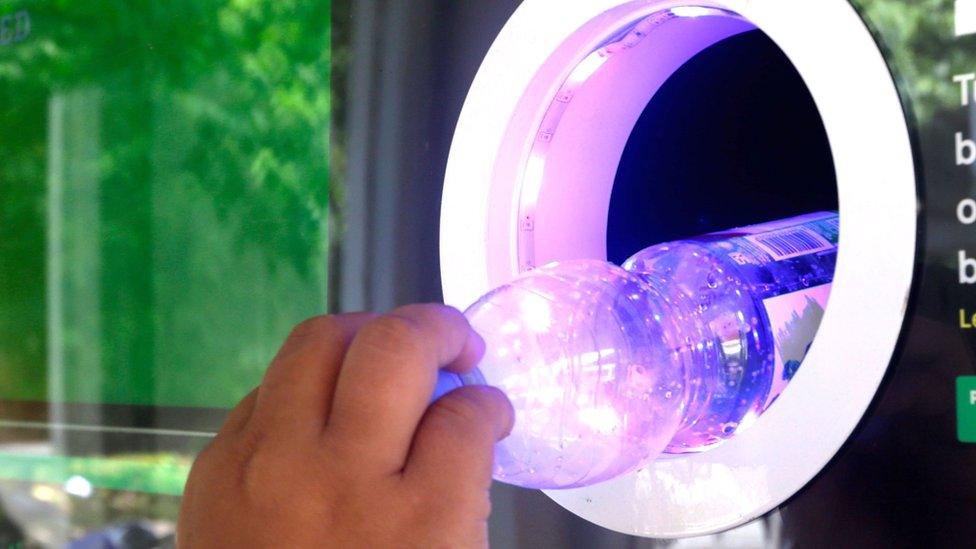Scottish deposit return scheme could be axed this month
- Published

Lorna Slater said Scottish ministers would have to decide its future if the UK does not give the go-ahead
Scotland's deposit return scheme could be axed later this month if UK ministers do not give the go-ahead, the circular economy minister has said.
Lorna Slater said if an exemption from the Internal Market Act was not confirmed then the Scottish government would have to decide on its future.
The BBC understands UK ministers are unlikely to reach an early decision.
Ms Slater told the Scottish Grocers' Federation that a lack of response could render the scheme "unviable".
Opposition parties accused the Scottish government of trying to "pass the buck" for problems with the recycling scheme to Westminster.
A UK government spokesman said it received a formal request for an exemption on 6 March, with the Scottish government having since paused the scheme until March of next year.
The spokesman added: "It therefore hasn't been possible yet for us to fully assess the impacts of the exclusion request on cross-UK trade, firms and consumers.
"We will continue to engage with the Scottish government to realise our shared ambition to improve the environment while meeting the needs of consumers and businesses across the UK."
The scheme, which is aimed at increasing the number of single-use drinks bottle and cans that are recycled, was due to start in August.
Open letter
Ms Slater said she was still working closely with the UK government to make the launch happen.
The Scottish Green co-leader, who has been driving the initiative, said she would know "one way or the other" by the end of the month.
Groups such as Greenpeace UK, Keep Britain Tidy and the Marine Conservation Society have signed an open letter to the prime minister, demanding the UK government grants an exemption for DRS in Scotland under the Internal Market Act - which regulates trade in the different parts of the UK following Brexit.
The letter, which has also been signed by the Association for the Protection of Rural Scotland, Friends of the Earth Scotland, WWF Scotland, Keep Scotland Beautiful, Keep Northern Ireland Beautiful and Keep Wales Tidy, said the scheme was "the single most effective policy tool available to reduce litter in our towns and countryside".
They told Mr Sunak that businesses in Scotland have "already invested hundreds of millions of pounds" ahead of the scheme being brought in, and they "would be substantially out of pocket if the launch date was changed again".

Bottles and cans could be returned over the counter or through reverse vending machines
The scheme requires Westminster to grant an exemption to the UK-wide Internal Market Act, given its possible implications for business elsewhere in the UK.
It has faced opposition from many small breweries and distillers.
It will see 20p added to the price of a single-use drinks container in Scotland, which will be refunded to people who return the container for recycling.
Some retailers will accept returns over the counter while larger stores, shopping centres and community hubs will operate automated receiving points known as reverse vending machines.
Recycling schemes are currently operated by local authorities, with glass collections being a source of income for councils.
'Growing urgency'
Circularity Scotland, a not-for-profit company established to administer the new scheme, said the ongoing uncertainty was causing a crisis for its future.
Its chief executive David Harris, said: "We have written to the prime minister and first minister to stress the growing urgency around this and make it clear that many millions of pounds and hundreds of jobs are at risk if there is further delay.
"Business and industry have come together to make this a reality, without any cost to the taxpayer.
"However, we now find ourselves caught in a policy vacuum which calls the very future of delivering successful deposit return schemes in the UK into question."


If the Deposit Return Scheme is scrapped, how would it reflect on the Scottish government?
Would it be a political humiliation for them? A decision to scrap an initiative they had defended then delayed in the face of intense criticism from some businesses?
Or would it be a demonstration of the limits of devolution and an argument for independence? A decision effectively forced upon the Scottish government because the UK government would not play ball.
The signs are the Scottish government is preparing to argue the latter is the case.
If the UK government did not grant an exemption to the Internal Market Act, supporters of independence could attempt to turn it in to a constitutional issue.
As with gender recognition reform or the power to hold a second independence referendum, the issue for many independence supporters would ultimately be about the power of the Scottish Parliament - not the rights or wrongs of the policy in question.
But pro-union parties would in turn accuse the Scottish government of simply engaging in a turf war with Westminster.
And with so many in the business world concerned about the practicalities of the Deposit Return Scheme, the opposition parties would be likely to accuse the Scottish government of picking the wrong fight.

Ms Slater, who previously came under fire for refusing to reveal details of Circularity Scotland's finances, told BBC Scotland the delay was causing "enormous uncertainty" for businesses in Scotland.
"We're in such a frustrating situation," she said. "We have put in so much work towards Scotland's return scheme.
"We estimate around £300m has been invested in Scotland, jobs have been created, IT systems been set up, vehicles have been purchased, sorting centres are underway, we are ready to go.
"The only thing we're waiting for is the prime minister to issue this exemption to the Internal Market Act that we first started working on with the UK government back in 2021."
The minister urged the UK government to agree to the exclusion "by the end of May at the latest", adding it was "essential to the successful delivery of the scheme."
'Trying to pass the buck'
But the Scottish Conservatives accused Ms Slater of "trying to pass the buck" to Westminster.
MSP Maurice Golden told the BBC's Good Morning Scotland programme that Ms Slater's intervention was "utterly bizarre" and an "attempt to stoke constitutional grievance".
He said while an exemption "would be welcome", there were still "major concerns about the operational viability which have nothing to do with UK government".
Mr Golden called for a change of minister in charge of the scheme because Ms Slater had "completely lost the confidence of environmental groups, businesses and consumers".